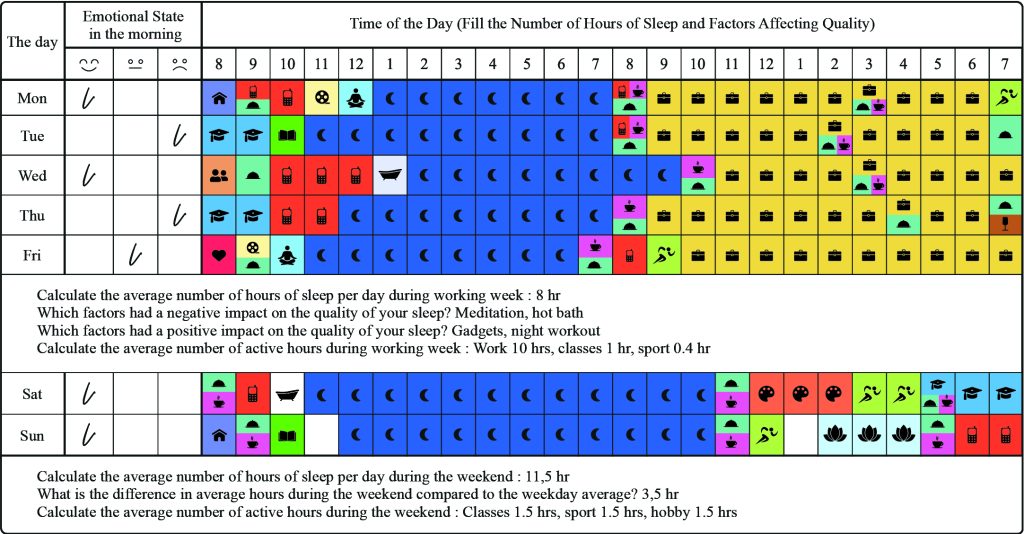
 – alcohol
– alcohol – work out (gym, walks, yoga, pilates, etc.)
– work out (gym, walks, yoga, pilates, etc.) – gadgets (social media, games, messengers, etc.)
– gadgets (social media, games, messengers, etc.) – coffee and energetic drinks
– coffee and energetic drinks – meals
– meals – work
– work – education
– education – reading
– reading – sleep
– sleep – family and friends
– family and friends – home
– home – tv
– tv – meditation and relax
– meditation and relax – hobby and other activities
– hobby and other activities – date, relationship
– date, relationship – chill
– chillSleep Patterns
In this weekly tracker example, there is a mismatch between the amount of sleep during the workweek (an average of 8 hours) and the weekends (an average of 11.5 hours). This indicates the presence of social jet lag, where the body needs more recovery time than the current schedule allows. The difference suggests that the optimal amount of sleep should be around 9-10 hours for proper recovery.
Determining Chronotype
This chronotype corresponds to the intermediate type (dove), which can shift to earlier or later wake-up times depending on necessity, season, and sunlight exposure. The ideal wake-up time without an alarm is 9 AM, with bedtime at 10 PM.
Habits Affecting Sleep Quality
In this tracker, certain habits negatively affect sleep quality, especially for those with a daytime chronotype. Evening activities like intense sports and using gadgets or watching movies can worsen sleep and reduce nighttime recovery. On the positive side, habits such as taking baths and meditating have been shown to improve sleep quality and recovery.
Additionally, there is a habit of eating late (after 8 PM), which should be shifted to an earlier time, such as 6-7 PM, so that meals are consumed 3-4 hours before sleep.
Alcohol consumption is minimal, but it’s best to limit it to 1-2 glasses of light alcohol per week. Ideally, alcohol should be consumed during the day, preferably before 6-7 PM, as it not only stimulates the nervous system but also adds extra calories.
Balance of Active Hours and Rest Hours (Including Weekend Rest)
In this example, the workweek is very active and packed with intensive work. The weekends are not only busy but also varied, providing a good balance for quality body recovery. To boost efficiency, incorporating regular exercise twice a week during lunchtime and replacing evening gadget use with short walks can be beneficial. This approach will enhance productivity and mental flexibility. Over time, this will lead to greater work efficiency and a reduction in total working hours.
Seasonality and Region
This tracker uses typical indicators for the winter period in the European zone, where daylight hours are limited, requiring the body to have slightly more hours for recovery. During periods of active sunlight, this chronotype will tend to require fewer hours of sleep and wake up earlier.



